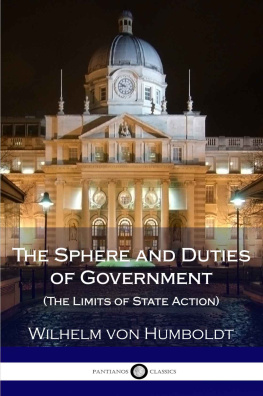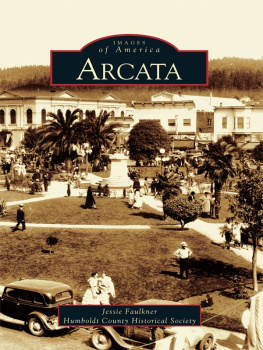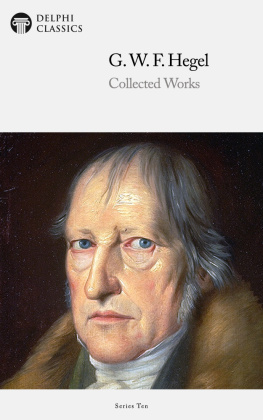Wilhelm von Humboldt - The Sphere and Duties of Government (The Limits of State Action)
Here you can read online Wilhelm von Humboldt - The Sphere and Duties of Government (The Limits of State Action) full text of the book (entire story) in english for free. Download pdf and epub, get meaning, cover and reviews about this ebook. year: 2017, genre: Science. Description of the work, (preface) as well as reviews are available. Best literature library LitArk.com created for fans of good reading and offers a wide selection of genres:
Romance novel
Science fiction
Adventure
Detective
Science
History
Home and family
Prose
Art
Politics
Computer
Non-fiction
Religion
Business
Children
Humor
Choose a favorite category and find really read worthwhile books. Enjoy immersion in the world of imagination, feel the emotions of the characters or learn something new for yourself, make an fascinating discovery.
- Book:The Sphere and Duties of Government (The Limits of State Action)
- Author:
- Genre:
- Year:2017
- Rating:4 / 5
- Favourites:Add to favourites
- Your mark:
- 80
- 1
- 2
- 3
- 4
- 5
The Sphere and Duties of Government (The Limits of State Action): summary, description and annotation
We offer to read an annotation, description, summary or preface (depends on what the author of the book "The Sphere and Duties of Government (The Limits of State Action)" wrote himself). If you haven't found the necessary information about the book — write in the comments, we will try to find it.
The Sphere and Duties of Government (The Limits of State Action) — read online for free the complete book (whole text) full work
Below is the text of the book, divided by pages. System saving the place of the last page read, allows you to conveniently read the book "The Sphere and Duties of Government (The Limits of State Action)" online for free, without having to search again every time where you left off. Put a bookmark, and you can go to the page where you finished reading at any time.
Font size:
Interval:
Bookmark:
(The Limits of State Action)
By Wilhelm von Humboldt
Translated by Joseph Coulthard

Published by Pantianos Classics
eBook Edition
First published in 1854
C ontents
T he book of which a translation is here offered to the English reader was published posthumously at Berlin, in the year 1852, by the Authors younger brother, Alexander von Humboldt, the eminent Naturalist. It appeared under the title of Ideen zu einem Versuch, die Grnzen der Wirksamkeit des Staats zu bestimmen; forming part of the seventh and concluding volume of the Gesammelte Werke of its distinguished author. Written in 1791, in his early manhood, and at a time when the ideas which it unfolds were in striking contrast to the events and opinions of the day, the book was long obnoxious to the scruples of the German Censorship; and his friend Schiller, who took much interest in its publication, had some difficulty in finding a publisher willing to incur the necessary responsibility. The Author therefore retained the manuscript in his possession, revising it from time to time, and re-writing considerable portions, which appeared in Schillers Thalia and the Berlin Monthly Review; but, although the obstacles which at first opposed the issue of the book were subsequently removed, it was never given to the world in a complete form during his life. It is probable that his important official engagements, [1] and those profound studies in critical philology, of which we have such noble and enduring monuments in the literature of Germany, left him no leisure to revert to this the chosen subject of his earlier labours. But we cannot but feel grateful to his distinguished brother, for giving publicity to a treatise which has such strong claims to attention, whether we regard the eminence of its Author as a philosopher and a statesman, the intrinsic value of its contents, or their peculiar interest at a time when the Sphere of Government seems more than ever to require careful definition. To Englishmen, least of all, is it likely to prove unattractive or uninstructive, since it endeavours to show the theoretical ideal of a policy to which their institutions have made a gradual and instinctive approximation; and contributes important ideas towards the solution of questions which now lie so near to the heart and conscience of the English public.
With respect to the translation, I have aimed at scrupulous fidelity; believing that, even where there may be some obscurity (as in one or two of the earlier chapters), the intelligent reader would prefer the ipsissima verba of so great a man, to any arbitrary construction put upon them by his translator. Still, I have spared no pains to discover the authors sense in all cases, and to give it in simple and unmistakable words; and I would here mention, with grateful acknowledgment, the valuable assistance I have received in this endeavour from my accomplished German friend, Mr. Eugen Oswald: those who are best acquainted with the peculiarities of thought and style which characterize the writer, will be best able to appreciate the importance of such assistance.
In conclusion, I cannot but feel that there may be many to whom this book contains little to recommend itself;little of showy paradox or high-sounding declamation, little of piquant attack or unhesitating dogmatism, little immediate reference to sects, or parties, or political schools; but I would also venture to anticipate that there are others, to whom the subject is no less congenial, who would willingly listen to a calm investigation of the most important questions that can occupy the attention of the statesman and the moralist, to earnest ideas clothed in simple and well-measured words; and that these will receive with welcome any worthy contribution to the expanding opinions of our day and nation, and look in these Ideas, perhaps not unsuccessfully, for some true and abiding materials towards the structure of some fairer polity of the future.
Brampton, August 4th, 1854.
Note: In the MS. of the Third Chapter, on Positive Welfare, there occurs an hiatus of a few pages. This has not been supplied in the German edition, published by the Authors brother; but the thread of the argument is sufficiently clear, from the Authors summary, to occasion little difficulty to the reader in continuing it in his own mind.
T o discover the legitimate objects to which the energies of State organizations should be directed, and define the limits within which those energies should be exercised, is the design of the following pages. That the solution of this prime question of political philosophy must be pregnant with interest and high practical importance is sufficiently evident; and if we compare the most remarkable political constitutions with each other, and with the opinions of the most eminent philosophers, we shall, with reason, be surprised to find it so insufficiently discussed and vaguely answered; and agree, that any attempt to prosecute the inquiry with more success, is far from being a vain and superfluous labour.
Those who have either themselves remodelled the framework of State constitutions, or proposed schemes of political reform, seem mostly to have studied how to apportion the respective provinces which the nation, and any of its separate elements, should justly share in the administration,to assign the due functions of each in the governmental plan,and to adopt the precautions necessary for preserving the integrity of the several interests at stake. But in every attempt to frame or reorganize a political constitution, there are two grand objects, it seems to me, to be distinctly kept in view, neither of which can be overlooked or made subordinate without serious injury to the common design; these arefirst, to determine, as regards the nation in question, who shall govern, who shall be governed, and to arrange the actual working of the constituted power; and secondly, to prescribe the exact sphere to which the government, once constructed, should extend or confine its operations. The latter object, which more immediately embraces the private life of the citizen, and more especially determines the limits of his free, spontaneous activity, is, strictly speaking, the true ultimate purpose; the former is only a necessary means for arriving at this important end. And yet, however strange it may appear, it is to the attainment of the first of these ends that man directs his most earnest attention; and, as it becomes us to show, this exclusive pursuit of one definite purpose only coincides with the usual manifestation of human activity. It is in the prosecution of some single object, and in striving to reach its accomplishment by the combined application of his moral and physical energies, that the true happiness of man, in his full vigour and development, consists. Possession, it is true, crowns exertion with repose; but it is only in the illusions of fancy that it has power to charm our eyes. If we consider the position of man in the universe,if we remember the constant tendency of his energies towards some definite activity, and recognize the influence of surrounding nature, which is ever provoking him to exertion, we shall be ready to acknowledge that repose and possession do not indeed exist but in imagination. Now the partial or one-sided man finds repose in the discontinuance of one line of action; and in him whose powers are wholly undeveloped, one single object only serves to elicit a few manifestations of energy. It may be well to observe, before deriving inferences from these general considerations on the usual tendency of mans activity, that the dissatisfaction we notice as attendant on possession, does not at all apply to that ideal of human perfection which is conceivable by imagination; but it is true, in the fullest sense, of the wholly uncultured man, and proportionately true of every intermediate gradation between this utter want of culture and that ideal standard above mentioned. It would appear then, from these general characteristics of human nature, that to the conqueror his triumph affords a more exquisite sense of enjoyment than the actual occupation of the territory he has won, and that the perilous commotion of reformation itself is dearer to the reformer than the calm enjoyment of the fruits which crown its successful issue. And thus it is true, in general, that the exercise of dominion has something in it more immediately agreeable to human nature than the mere reposeful sense of freedom; or, at least, that the solicitude to secure freedom is a dearer satisfaction than that which is afforded by its actual possession. Freedom is but the possibility of a various and indefinite activity; while government, or the exercise of dominion, is a single, but yet real activity. The ardent desire for freedom, therefore, is at first only too frequently suggested by the deep-felt consciousness of its absence.
Font size:
Interval:
Bookmark:
Similar books «The Sphere and Duties of Government (The Limits of State Action)»
Look at similar books to The Sphere and Duties of Government (The Limits of State Action). We have selected literature similar in name and meaning in the hope of providing readers with more options to find new, interesting, not yet read works.
Discussion, reviews of the book The Sphere and Duties of Government (The Limits of State Action) and just readers' own opinions. Leave your comments, write what you think about the work, its meaning or the main characters. Specify what exactly you liked and what you didn't like, and why you think so.









